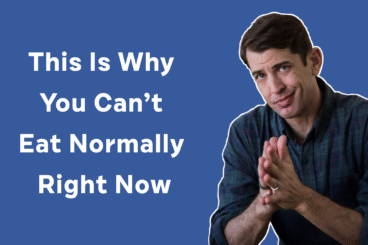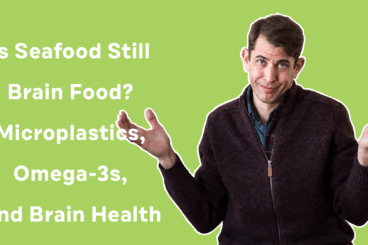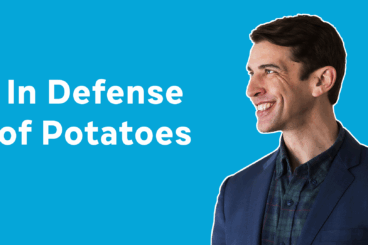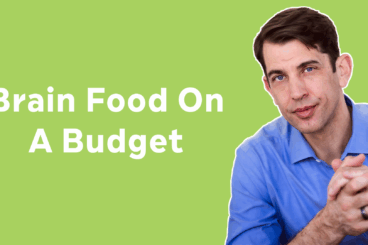Let’s talk about diet and anxiety. There has been a lot of recent discussion about anxiety and diet and there was a scoping review on this topic which you can check out here. I want to talk about some of the applications if you are struggling with anxiety and what you can do in your diet on a day-to-day basis to help out with that. Anxiety disorders, whether generalized anxiety, panic disorder, specific or social phobia, all revolve around the idea of excessive worry. So how can diet relate to this? Well, there’s been a lot of research, mostly in animal models, but also in human work around how diet can impact anxiety. For example, there has been significant data that certain nutrients like zinc, relate to anxiety. It is helpful for individuals to look at their diet, understand where there are gaps in some of these nutrients and then work in food categories. What food categories can we use in your diet to help you decrease the chances of anxiety?
Now, sometimes along with food choices, we need to also consider when and how people are consuming their foods. For example, I’ve worked with individuals that have panic disorder and part of helping them, was understanding the sequencing or timing of their food. I had a patient who was having a lot of panic attacks on the commute home from work, and part of that was because she was having a hard time maintaining proper nourishment. By the end of the day, she’d end up with low blood sugar and in settings that would trigger her and by helping her have higher quality snacks at work and prepare for the commute, her panic attacks decreased by maybe 80 or 90%. So that’s an example where timing plays a role. Maybe some of you are skipping breakfast and having a lot of anxiety mid-morning. That might be a place to look into.
Stimulants
Let’s go over some of the foods now. First, individuals need to look for stimulants in their diet. These can be things like maca powder, green tea extracts, coffee, or even dark chocolate. Individuals who are really sensitive to a class of molecules called theobromine, which is what is in dark chocolate, can cause a stimulating effect which add to anxiety, rapid heart rate, and heart palpitations. So if you’re struggling with anxiety, you’ll want to try and minimize those theobromines and caffeine and switch from something like coffee to green tea is a way to do that, or adding in a little more decaf. If you drink a lot of coffee I would say tapering that off is very important so you don’t end up sluggish or experience withdrawal symptoms like headaches.
Fermented foods
After looking to see if there are any obvious culprits, let’s think about the types of foods you want to add into your diet when you struggle with anxiety or other mental health concerns. First on my list when I see a patient with anxiety, I get curious about fermented foods in their diet. The reason is there is so much research on the microbiome, how it influences the immune system and inflammation and how that potentially relates to anxiety. It is also one of those food categories, as a nutritional psychiatrist, I see a lot of people not even considering. It is an exciting moment for a patient when they realize where there’s this whole food category that can really transform the health of the microbiome and potentially impact anxiety. I recommend eating more fermented foods, usually kefir, which is this liquidy fermented dairy product, because it has a lot of colony forming units, more than most people’s probiotics. If somebody is new to fermented foods I would suggest maybe something simple like a kombucha or a miso soup. There are lots of fermented foods and this is the first food category that I ask my patients with anxiety about.
Add in plants
The second category is plants. In nutritional psychiatry, we think about leafy greens, rainbow vegetables, and helping people have a more plant forward diet. The reason is because when you’re eating high quality plants, broccoli, cauliflower, and kale for example you’re getting a lot of fiber, a lot of water and hydration, and a lot of vitamins and minerals which we call nutrient density. These are really fundamental principles of nutritional psychiatry. Along with those, we have the rainbow vegetables. These are colorful vegetables. Why do we want all these plants? Well, what do those bugs from the fermented foods in your gut need to eat? They need high quality fibers. So eating a lot of plants in your diet is a way of feeding that microbiome and keeping it healthy.
Long chain omega-3 fats
The next category is long chain omega-3 fats. This is our favorite brain fat. Long chain omega-3 fats are EPA and DHA. You find those in seafood. For all the vegans and vegetarians watching, look towards an algae supplement because there aren’t long chained omega-3 fats in plants other than algae. Look for high quality fish without mercury or microplastics and lots of omega-3 fats. Those fish are going to be the sardines, anchovies, wild salmon, mussels, clams, and oysters. Mussels and oysters have a fair amount of omega-3 fat where you get all this minerality such as zinc, selenium, and iodine that we know are, are really critical when it comes to anxiety.
A final point I want to make is the way that anxiety affects our eating behavior. I’m like an anxious snacker so when I get a little anxious and I’ll want a bunch of beverages. I’ll want a seltzer and a Hop Wtr and a tea.
I’ve tried to understand that about myself and make sure that when I am in that mindset, first of all, to be aware of it. It’s okay to do some emotional eating but I want to be aware of it. Then I make sure that I’m feeding that anxiety with high quality snacks such as raw, unsalted nuts, seeds such as pistachios or pumpkin seeds. Another option is trying to get a little protein in there. Something like hummus, salmon jerky or high quality beef jerky is great to nibble on. So instead of eating ultra processed foods and dealing with the problems that come along with them such as bad fats, lots of salt, sugars and food additives we instead switch over to snacks that are feed our mental health.
I hope these ideas help you. Anxiety is a challenging disorder. It can affect and lower our appetite. It can lead to anxious eating and it can make us feel overwhelmed and out of control. That’s where nutrition and nutritional psychiatry can be a great tool for you by really working on settling down and being mindful about your nutritional status. Understanding that nutrition is a great opportunity when you’re struggling with your mental health. You shouldn’t be worried all the time about getting every nutrient. That’s not what we’re about in nutritional psychiatry. It is much more so that you can feel empowered that there is a tool that you have at your disposal to help calm things down, to make sure that your brain is properly nourished and to minimize whatever anxious symptoms could be stemming from not having enough magnesium or zinc or not having a healthy, diverse microbiome. I hope these tips help you as you think about nutrition and anxiety.




Great information – I appreciate the specific recommendations on foods to recommend to patients (and the acknowledgement that we all do some emotional eating from time to time).